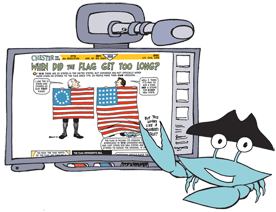

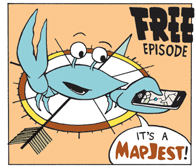

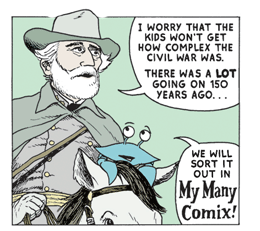
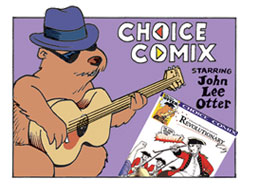
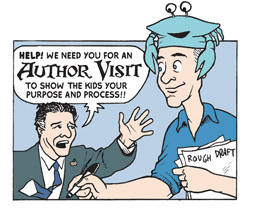

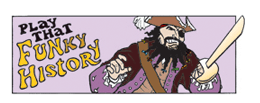

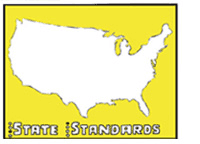


Comic books that bring history to life!
|
|

|
 |
||
 |
"In Williamsburg this summer I bought two of your books. They are great!" George, six-year-old from Georgia |
|
|
|
||
Welcome to Chester Comix! Inside this site you'll find fun samples of the way Bentley Boyd uses comix to spark interest in history for reluctant readers! Check what he's drawing now, go with him to weird historical sites across the country, or download a coloring page and put your own words into his drawings! This home page features my most recent news/blog entries. Learn more about my blog. Have fun! --Bentley Boyd
30 on Earth Day
April 22nd, 2025
Today, Earth Day 2025, is the 30th anniversary of the first appearance of Chester the Crab.
I never planned this!
In 1995, I had just gotten my dream job of drawing five political cartoons a week for an American newspaper. THAT was my career goal. I had absorbed political cartoons in collected editions at the public library as a kid, I cut out my favorites and put them in a scrapbook, I drew them for the high school newspaper. And now, just five years out of college, I had joined the political smart aleck fraternity!!!
The Daily Press of Newport News, Virginia, had already encouraged my creativity for three years. My reporting assignments were fascinating (the archaeological search for Bacon’s Vault in Williamsburg!), my editors had just the right guiding touch, and the newsroom was full of smart, collaborative people. We were on the small end of the national chain of Chicago Tribune newspapers, but we punched well above our weight, as the old boxing saying goes. I was happy to add to that energy by contributing political cartoons on state and local issues.
And then something else happened. A door that I wasn’t looking for swung open.
The editors who were so supportive of my cartooning asked me to pitch in something fun for kids to the week-long coverage they planned for the 25th anniversary of Earth Day. I myself was a kid when the first years of Earth Day promoted environmental awareness in the 1970s; the annual event had a big impact on my own thinking about conservation and science. So now, as a new father, I gladly agreed to pitch in to the newspaper’s anniversary coverage in 1995.
An educational comic strip for kids needs a narrator, right? I drafted some ideas. I thought the turtle with the recycling triangle of arrows on his shell was pretty clever! I love turtles! But the editors urged me to think of a mascot that was more local, more unique. LOCAL was our bread and butter at the Daily Press. I am thankful they pushed me to think harder and reach higher.
Chesapeake Bay blue crabs had been an environmental symbol in eastern Virginia for several decades. Over-fishing and pesticide runoff from farms in Virginia and Maryland had caused the blue crab population to decline badly. But there was a sense of hope in 1995: serious environmental efforts were underway to revive this fascinating species. The timing for me was right. A Chesapeake Bay blue crab would make a great MC for a 25th anniversary celebration of Earth Day.
Chester got four episodes in that week’s paper to talk about environmental history and science. I had to work and make creative choices quickly (I was still drawing the daily political cartoons!), and I was working in sharp pain on the living room floor, drawing while on my belly (I had thrown my back out playing baseball with Daily Press friends!). Would Chester be crabby? No, making him grumpy would be too cliché; instead, I gave him my own cheerful and curious voice – that would make it easier to write him. Would Chester have the subtle and gorgeous coloring of a real blue crab? No, that would take too long to color, and I wouldn’t be able to imitate how beautiful blue crabs are anyway, so FLAT TEAL IT WAS! I love teal.
The Earth Day content came out. It all made a big splash. And we caught grownups reading and talking about Chester the Crab’s part of the coverage. It felt good to contribute something fun and unique.
But there were no plans to continue Chester as an educational comic. It was just an Earth Day 1995 assignment.
I ran through the open door. Why??? I already had my dream job! Sure, I devoured comic books. And I loved “Peanuts” like most of the kids in my generation did. But I had accepted in high school that I’d never draw Batman (skyscrapers are very, very boring to draw), and my attempt at selling a funny comic strip in the early 1990s – pizza delivery guy “Johnny Uh-Oh!” – didn’t go anywhere. Why would I keep drawing a comic strip starring Chester?
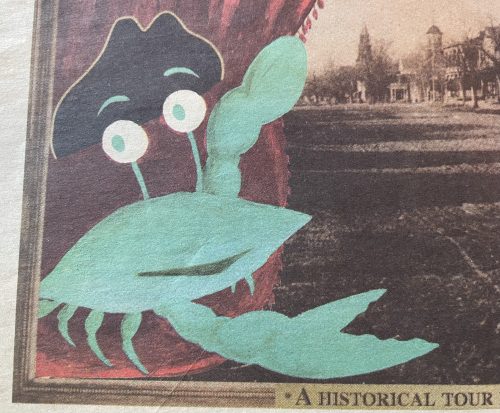
Because he’s pretty fun to hang out with. The character gave me a place to be my full self. He could be quirky and corny and curious. At first the follow-up episodes were haphazard. One was a full page of Chester giving parents advice on how to help their children behave and learn at a live theater performance! Another episode explained how a particular stock market thingy works! In 1997, I convinced the editors to give Chester a regular, weekly space, and for three years that was my life: drawing five political cartoons a week for the grownups and one Chester goof lesson for anyone who wanted to learn which came first, crunchy or creamy peanut butter.
The full switchover came in 1999, when the editors asked Chester to celebrate the 300th anniversary of Williamsburg, with him narrating a big tabloid section of history. That was too much fun for me, a history major. I gave up the political cartoons about new historical events so I could focus on drawing Chester episodes about historical politics. These Chester episodes ran five days a week during the school year and covered a quarter of a newspaper page! In 2003, the gracious Daily Press leaders agreed that I could reprint these episodes in book form, and Chester Comix LLC was born.
I’ve learned a lot of things from Chester in the past 30 years. I hope you have, too.
Posted in Author's Purpose | Comments Off on 30 on Earth Day
LIBERTY OR DEATH
March 12th, 2025
A few days from now will be the 250th anniversary of the speech that explained the reason for the American Revolution—15 months before Thomas Jefferson wrote on paper the more formal and legal arguments for the war.
Have you heard anything about this anniversary?
My interest in history was sparked by the national celebration of the Bicentennial of the American Revolution. In 1975 and 1976, the celebration was everywhere across pop culture and media! But now, for the 250th, I don’t see commemorative plates or big budget TV shows or clothing or toys or any big investment in historic sites from the beginning of our nation.
Perhaps today we are too busy re-fighting the war.
In 2025, social media has little discussion of the anniversary but a lot of debate about the principles of self-government. We are reliving the Revolution, not remembering it. There is little space for memorials when you are consumed by struggles in the present tense. Commemorative concerts and T-shirts happen when there is a safe distance from the fire and danger of revolution.
The Revolution didn’t start with a sudden event like Pearl Harbor or 9/11. A lot of economic and social issues grew over many years; some Americans pointed to the growing danger, but others ignored the politics and went about their daily lives. As more American colonists became anxious and fearful that their freedoms were in danger, some tried to argue with the king through existing institutions; other Americans took to the streets for protests, and some of those public protests became violent.
After the resistance had a tea party in Boston in December 1773, Britain’s government passed the Coercive Acts in the spring of 1774. “Coercive” things are meant to control—the opposite of freedom. The king sent warships and Redcoat soldiers to close the port of Boston—a kind of control that is bad for business. (Americans love freedom in business!) Early in 1775, Virginia’s royal governor imitated King George III by posting a British warship in the York River, a few miles from where colonial lawmakers met in Williamsburg.
So the rowdy lawmakers met in Richmond, 60 miles west of the warship and the governor’s royal control. It was time to decide the price of freedom they were willing to pay. Patrick Henry stood to speak on March 23, 1775, and made one of the most accurate predictions an American politician has ever voiced:
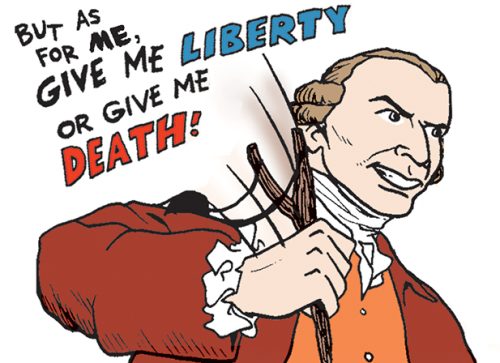
“There is no retreat but in submission and slavery. Our chains are forged! Their clanking may be heard on the plains of Boston. The war is inevitable, and let it come. I repeat it, sir: LET IT COME …
“Gentlemen may cry, ‘Peace! Peace!’ but there is no peace. The war is actually begun! The next gale that sweeps from the North will bring to our ears the clash of resounding arms. Our brethren are already in the field. Why stand we here, idle? What is it that gentlemen wish? What would they have? Is life so dear or peace so sweet as to be purchased at the price of chains and slavery?
“FORBID IT, Almighty God! I know not what course others may take, but as for me, GIVE ME LIBERTY OR GIVE ME DEATH!”
Patrick Henry was right. Just four weeks later, colonists fought with Redcoat soldiers in the Battle of Lexington and Concord outside of Boston. The shooting war was on.
250 years ago, Patrick Henry demanded that Americans pay attention. He demanded that freedom lovers prepare to fight for those freedoms.
Now, 250 years later, will we re-enact the choices that brave American patriots made? Or will we side this time with the Loyalists who were their neighbors? About a third of the Americans in 1775 were Loyalists—happy to let a king control their lives. The Revolution became a nasty civil war, neighbor against neighbor, over the ideas of self-government, freedom and justice.
I won’t live to see the 300th anniversary of the American Revolution. But what we decide during the 250th will shape all of human history for generations to come.
Posted in History Today | Comments Off on LIBERTY OR DEATH
CIVIL or WAR?
August 25th, 2024
American democracy is not made out of the marble pillars in Washington, D.C.
American democracy is not measured by the strength of our No. 1 economy or our No. 1 military.
And it’s not guaranteed by what the Founders wrote 250 years ago on pieces of paper.
Our self-government is nothing more solid than an idea.
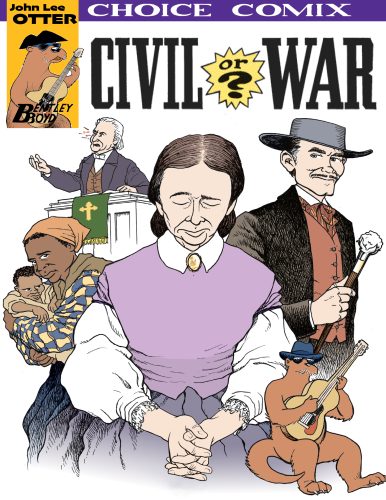
It’s like Tinker Bell: if we believe in our representative government, then it lives on. If we stop believing in it, it fades away among our personal daily distractions of shopping for groceries, answering e-mails and getting the kids to practice.
Many Americans have felt this fragility in the most recent 10 years of American history. I hope it’s some comfort to say: we’ve been here before. History records that our self-government has failed twice since the Declaration of Independence. The first form of our democracy outlined by the Continental Congress failed within 10 years, which caused the redo in Philadelphia in 1787 that gave us the U.S. Constitution. Then our government and society fell apart in the 1850s, and it took a civil war to rededicate what our self-government meant.
Since 1999, I’ve tried to tell historical stories as if the reader is living through them in the present tense. Because no tomorrow is guaranteed. No success is guaranteed. We all have choices to make today that will lead to other choices tomorrow. And then someone else later will look back and call our choices “history.” In 2023 and 2024, it felt time to take a closer look at the choices Americans made in the 1850s that chipped away at our representative democracy until finally someone chose to fire artillery at a U.S. Army fort in South Carolina.
My new “CIVIL or WAR?” is my third Choice Comic and is meant for readers a bit older than my “Civil War, vol. 1” and “Civil War, vol. 2” books speak to. Here is where a middle school or high school student can consider the hard questions that we all still grapple with today: What does it mean to be a citizen of the United States? How big or small should a group of voters be to feel like self-government really answers to what we want? How do we balance the wants of the majority of citizens with the civil rights of the minority of citizens?
I hope you enjoy the storytelling. Because “history” never ends . . .
Posted in Author's Purpose | Comments Off on CIVIL or WAR?

